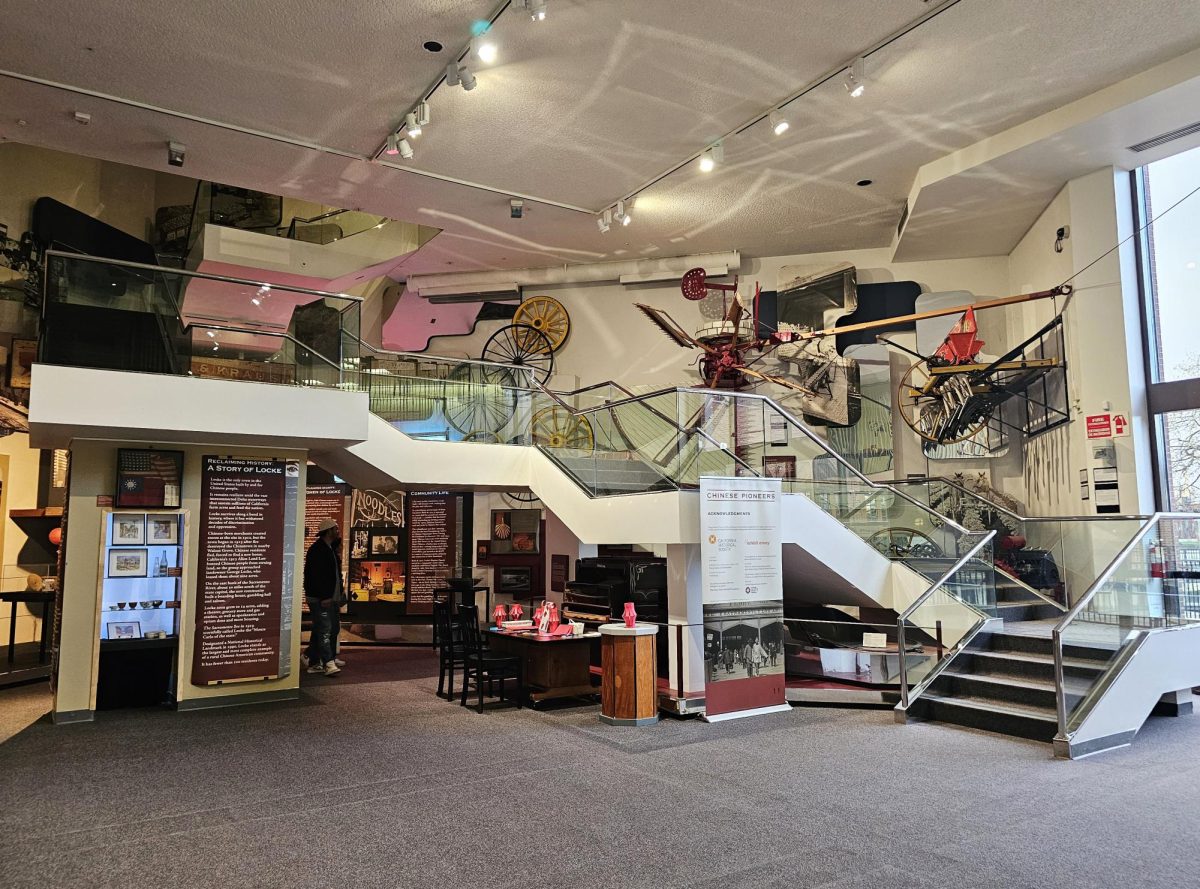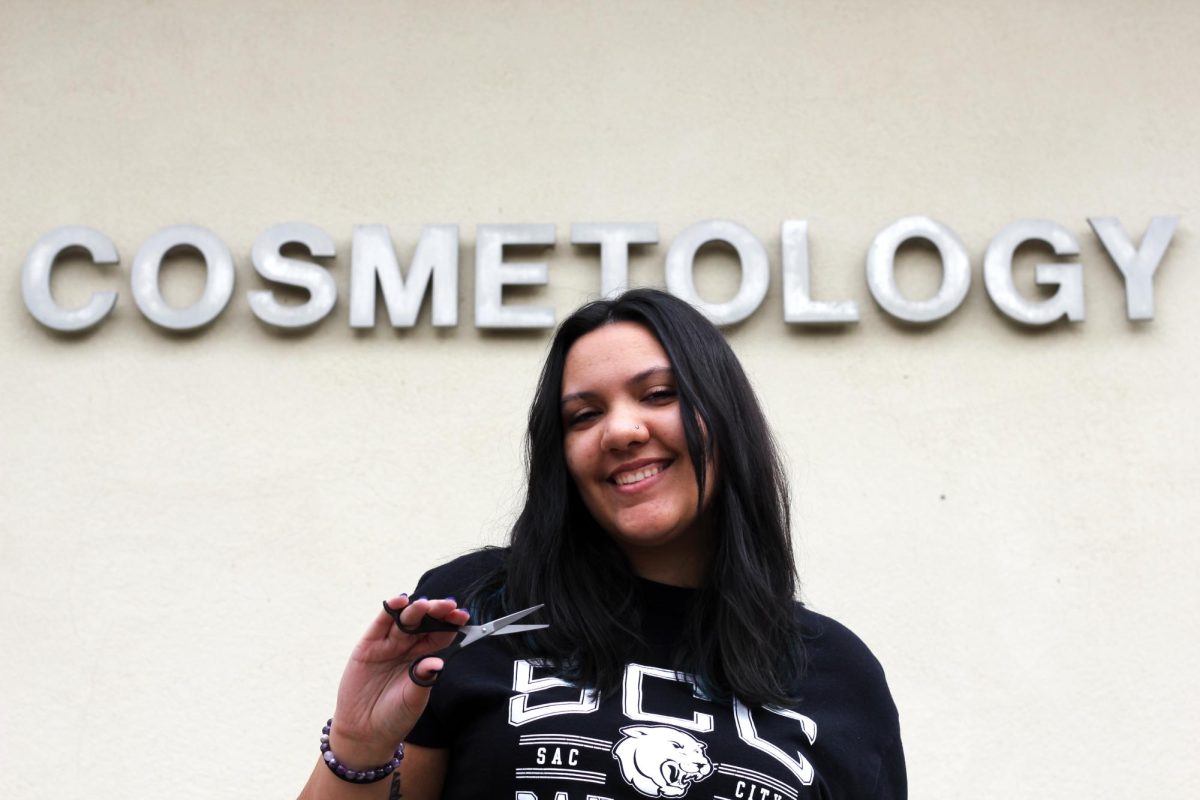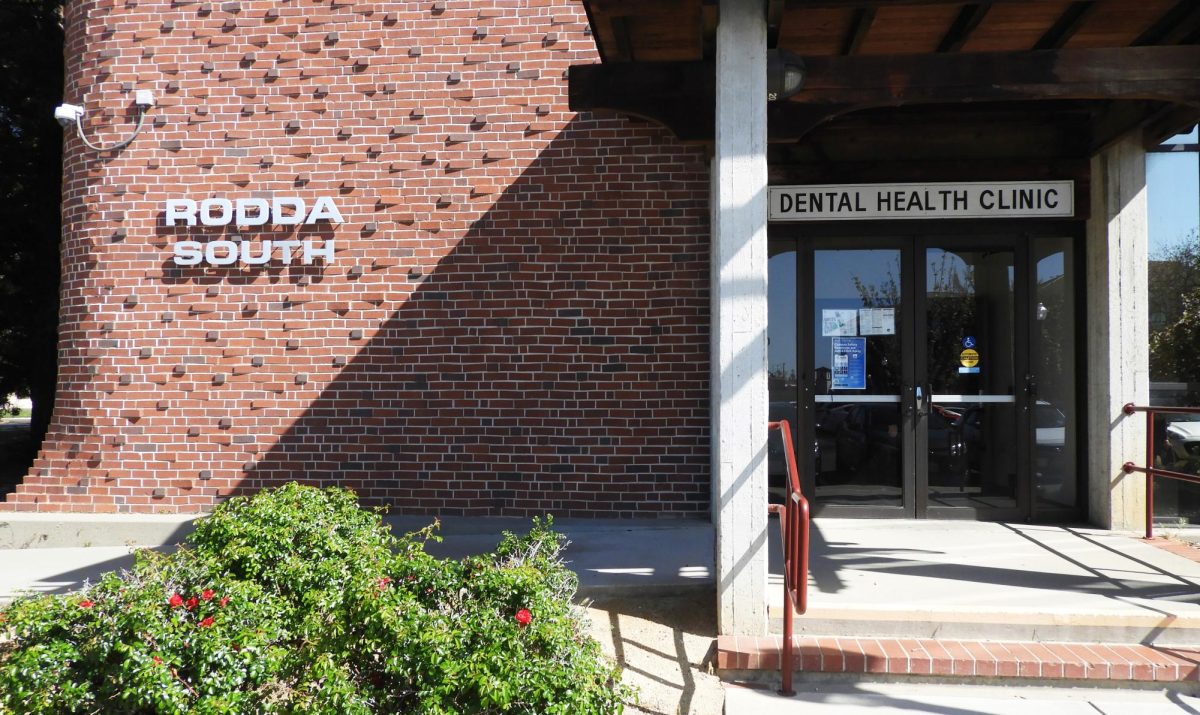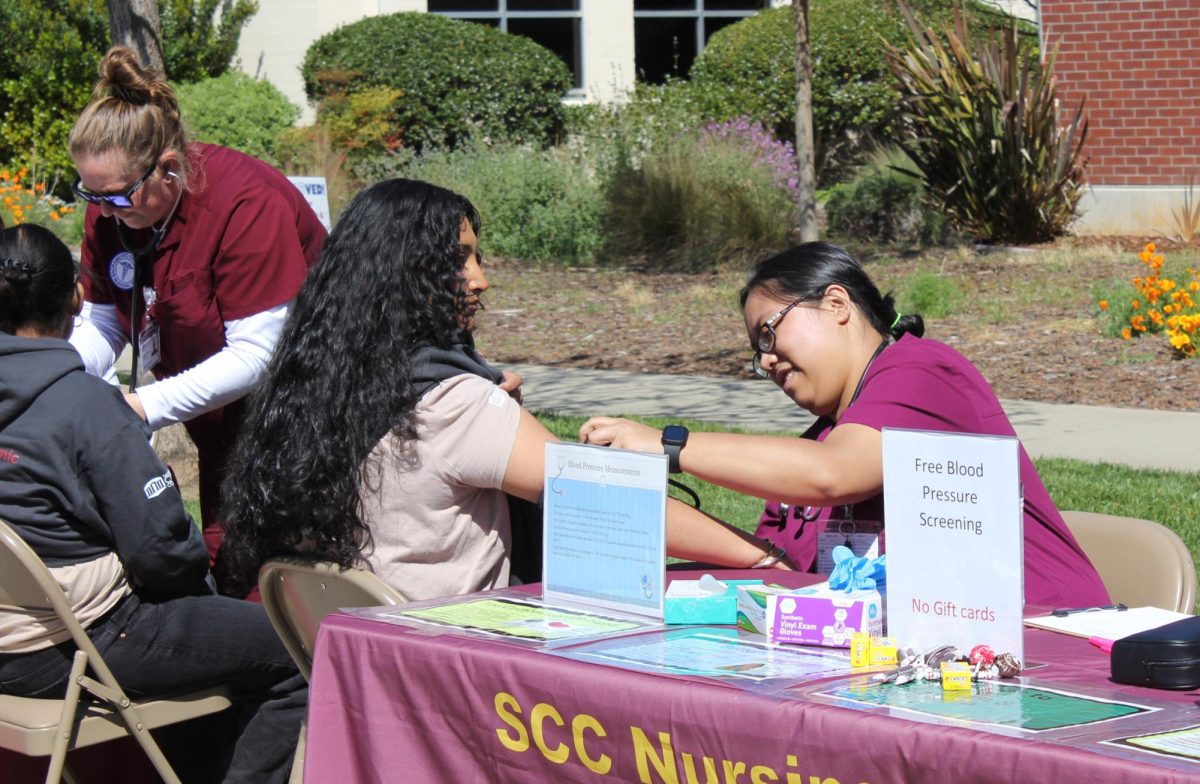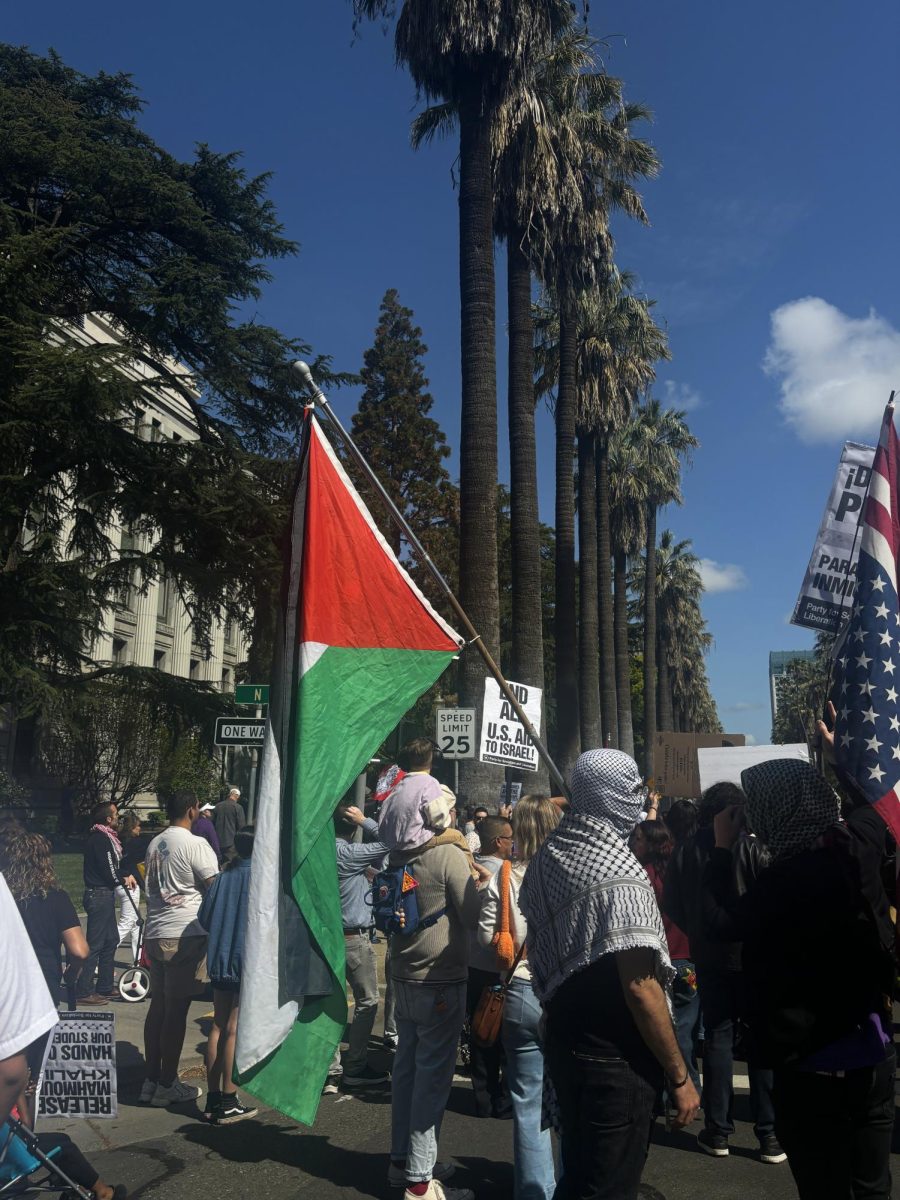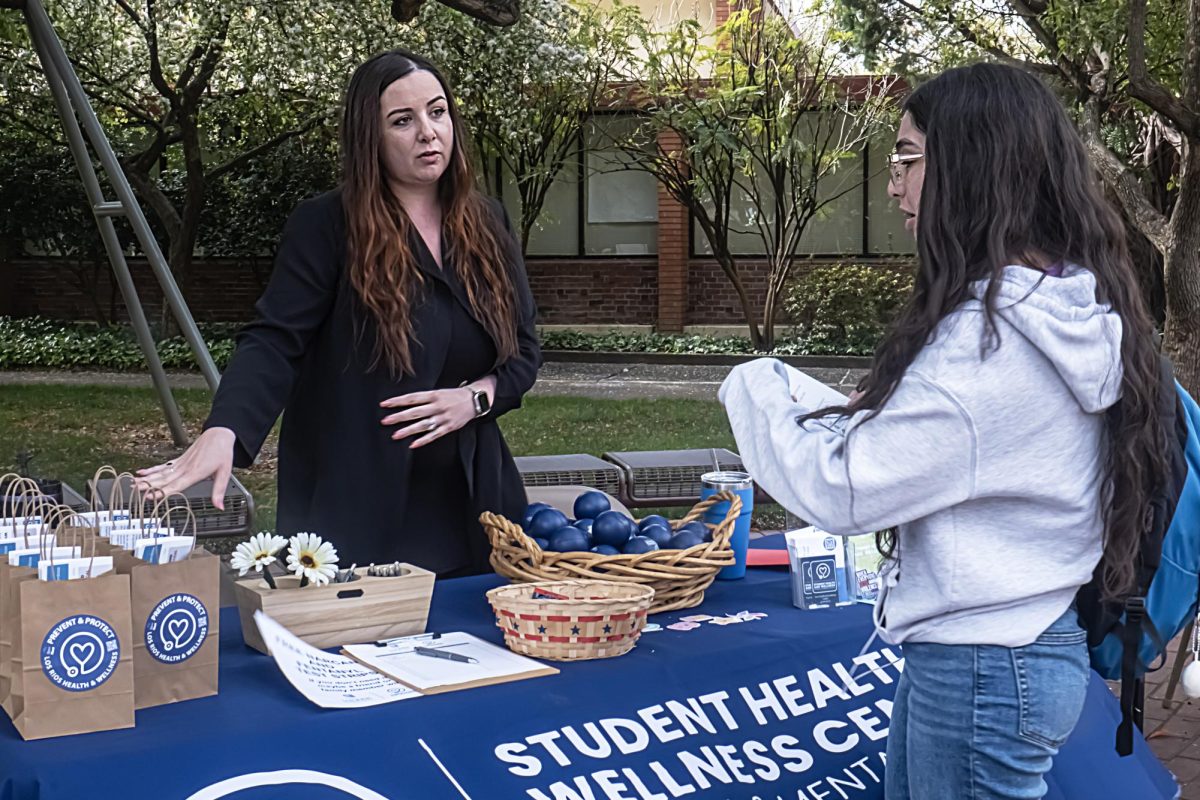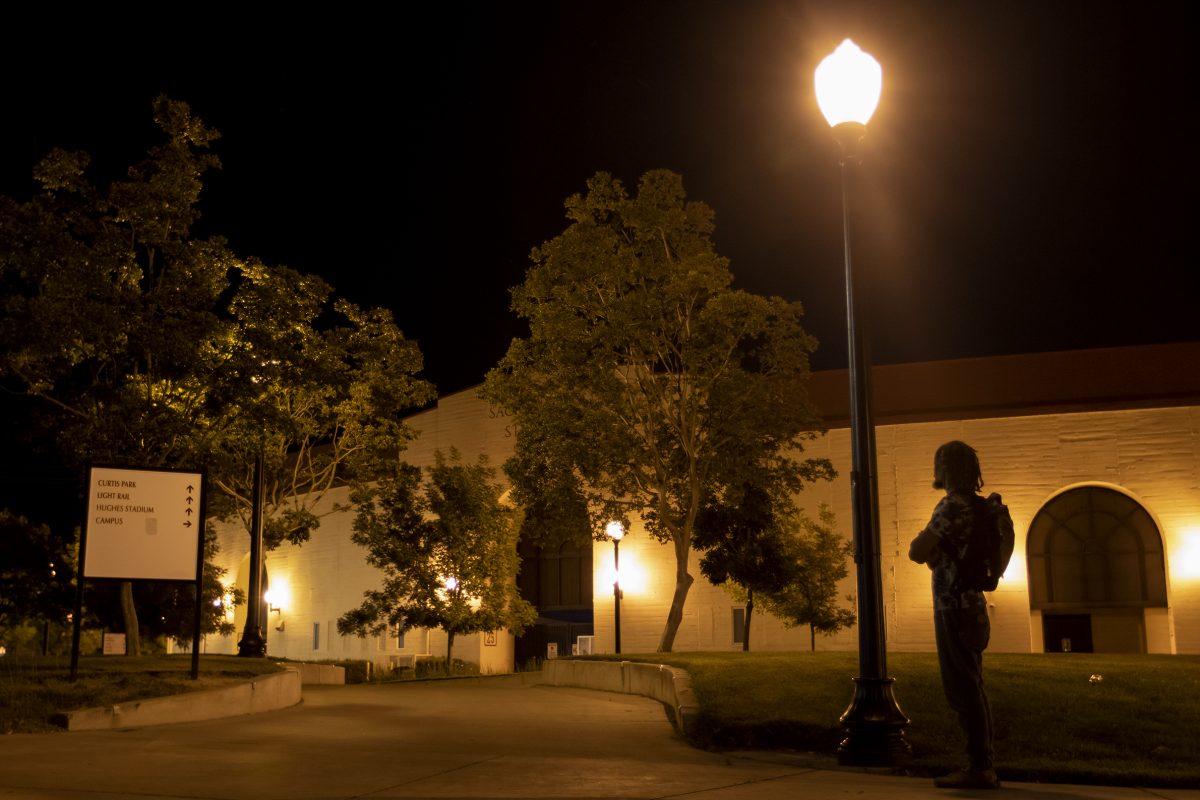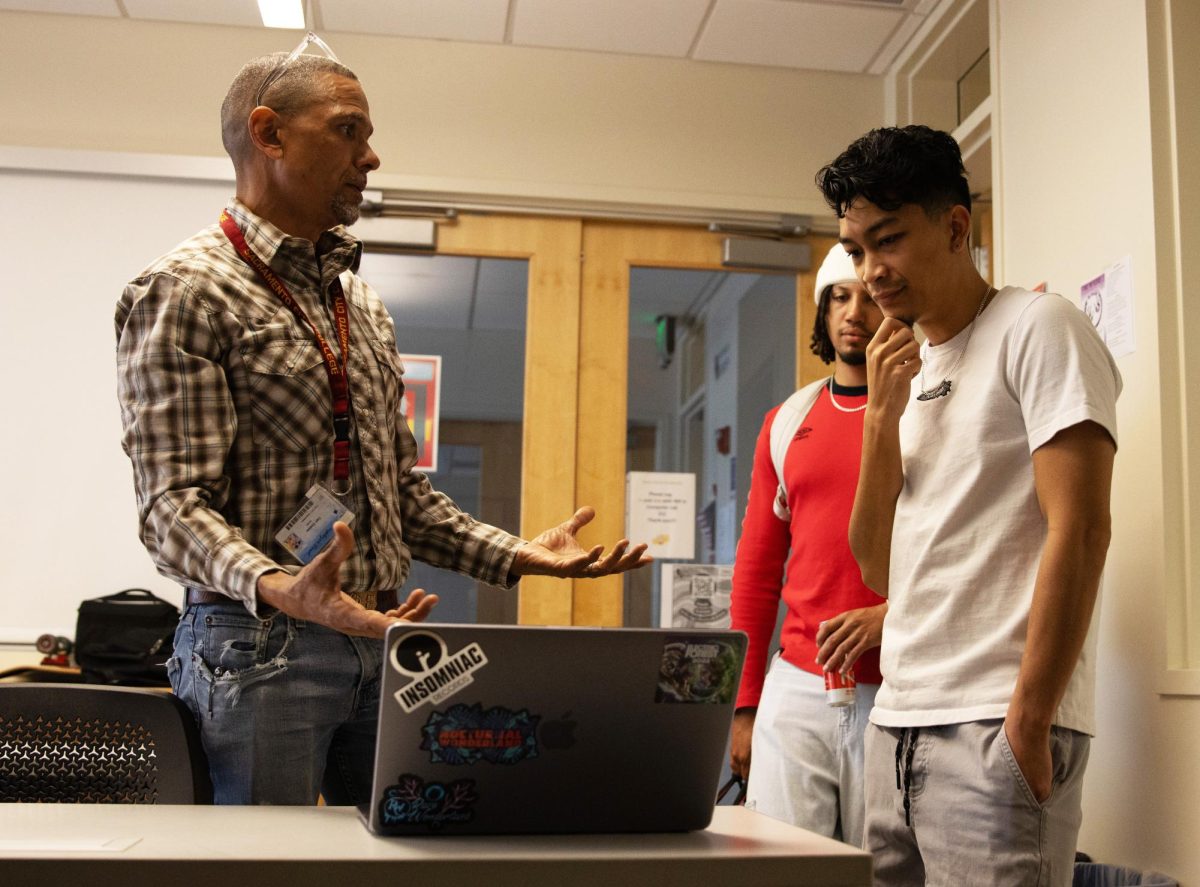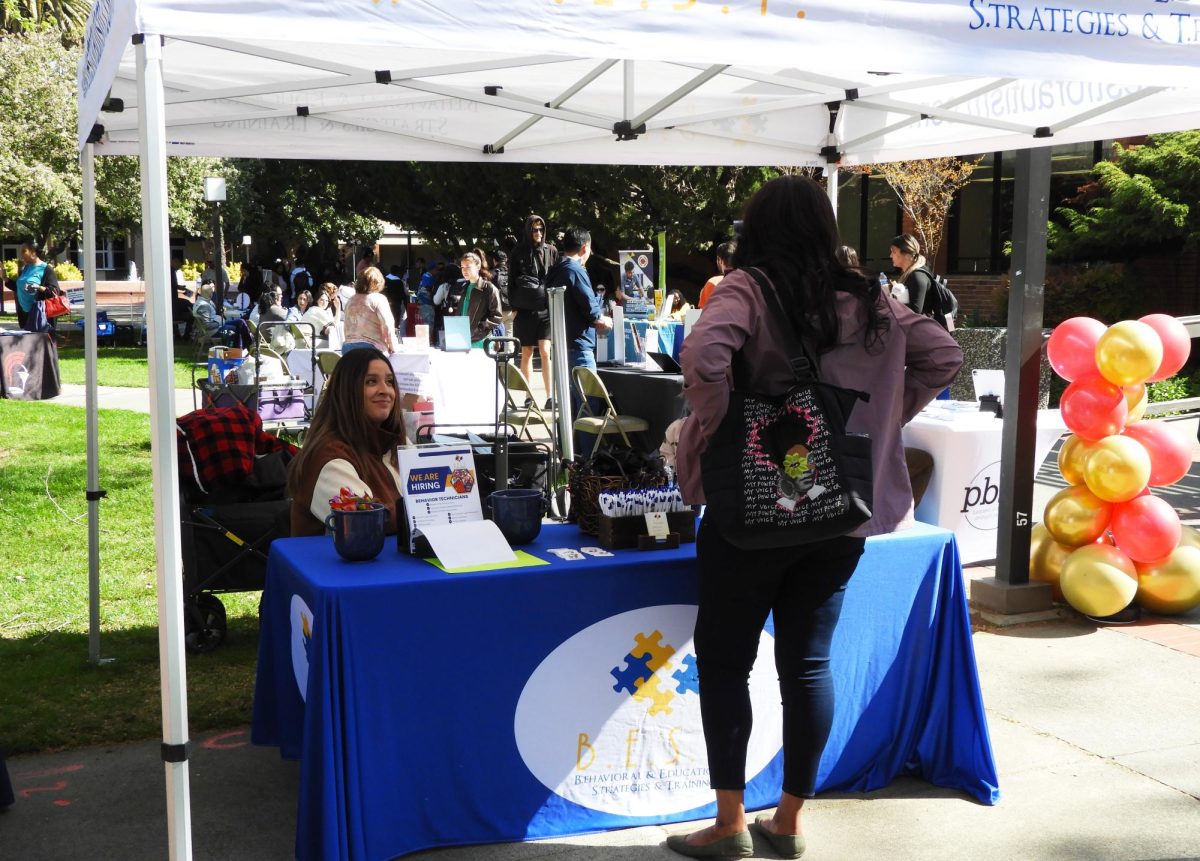By Ben Irwin
A tale of two wolves
A Black City College student’s detainment by police and life after
After leaving his music business class at Sacramento City College the evening of Oct. 10, 2019, Theo Scott-Femenella noticed something unusual on his walk back to the campus parking garage—five police officers surrounding a Black man.
While the conversation appeared calm, Scott-Femenella positioned himself under the light of a street lamp to watch until it was over.
“There was a part of me that was concerned for the situation. I just got this feeling in my gut that maybe this gentleman wasn’t safe,” said Scott-Femenella. “From the outside it looked like an aggressive, threatening stance, to have five police officers standing intensely around this Black man.”
The African-American student’s decision to “copwatch” the encounter got Scott-Femenella briefly detained by Sacramento PD and Los Rios PD and has raised questions about why—if police were investigating reports of an armed suspect on campus—City College didn’t warn students, faculty and staff.
In an October 2019 interview, shortly after the incident, Los Rios Police Chief Larry Savidge said a RAVE alert—a warning system for all Los Rios students, faculty and staff—wasn’t issued because there was no need for one.
“We quickly determined that there was no weapon involved, no weapon seen,” the police chief said. “That probably happened within less than five minutes of us arriving there. The student [Scott-Femenella] arrived about 15 minutes later from when the incident initially occurred.”
The decision Chief Savidge made to not issue a rave alert happened in real time, but in hindsight the decision proved lasting for Scott-Femenella. As a youth mentor, budding music producer and artist, the approximately 30 minutes he spent in Sacramento Police Department custody reinforced his belief that Black men are more likely to lose their freedom—or even their lives—if they come into contact with law enforcement.
“I felt wronged,” said Scott-Femenella. “This really furthered my distrust. My civil rights were violated, blatantly, and I was flat-out racially profiled.”
While Scott-Femenella could use his platforms of music and mentorship to further a negative narrative, he said he’s choosing to respond differently.
“What I’m focused on right now is pouring what happened to me back into music,” said Scott-Femenella, “back into the kids that I work with to keep them safe, and just trying to make a positive difference in our communities, to bring peace and compassion into places that see a lot of violence and heartbreak.”
That night, under the glow of the parking lot streetlight, Scott-Femenella stood in plain sight. He said he made a point to keep a safe distance.
“You need to stay very far away from the scene where the officers are conducting their work,” said Scott-Femenella. “You don’t want to involve yourself in the situation. I had this extremely strong urge to reach for my cell phone and record. I had that urge from the moment I walked up.”
For Scott-Femenella, all too familiar was the memory of Stephon Clark, a young Black man and fellow City College student shot dead in 2018 by SPD officers after mistaking his cellphone for a gun. Scott-Femenella decided against risking his life to record the incident.
Scott-Femenella said the situation changed when the man, SPD and LRPD officers—five in total—had surrounded began approaching him. Scott-Femenella asked the man if he was OK.
Scott-Femenella said he began to feel uncomfortable, not understanding the situation nor wanting to involve himself:
He took a step back.
In an instant, Scott-Femenella said the police officers charged toward both of them, shouting with their hands on their firearms.
After explaining to SPD Officer Lakin that he was coming from his music business class on campus, Scott-Femenella said the officer asked for his ID.
“No, it’s not Nazi Germany. I don’t just have to give you my ID for no reason,” Scott-Femenella said, noting he could see the frustration in the female officer as she glanced to the right.
Scott-Femenella said Lakin then repeated her request: “We need to see your ID.”
“I don’t have to give you my ID, but I will,” Scott-Femenella said. “I really don’t want to struggle with you all. I just want to go home.”
As soon as he handed over his ID, Scott-Femenella said Lakin gave him a grin and said they now had the right to detain him.
Handcuffed and seated by the officer on a curb, Scott-Femenella said the SPD officers informed him that he matched the description of a Black suspect reported to possess a rifle in a black backpack. The suspect had allegedly threatened the man police were interviewing when Scott-Femenella arrived on the scene.
LRPD Chief Savidge said the suspect was described as an African-American male in a light shirt and dark pants. Scott-Femenella said he was wearing a blue, striped shirt and red sweatpants that night, carrying a small black backpack.
Sacramento police spokeswoman Sgt. Sabrina Briggs confirmed that SPD officers were checking out a report of “a subject with a rifle on the school grounds” because there was only one LRPD officer on duty.
As the situation became more clear to Scott-Femenella, he said questions started pouring in his head: Why did they let the man being questioned walk up to him if they thought Scott-Femenella might be armed? Wouldn’t the man being questioned have ID’d him if he thought he was the one who threatened him? Why wasn’t he ID’d outright if he matched the description?
“I had to hold my tongue,” Scott-Femenella said. “I didn’t want to be there any longer than I did. I was detained unlawfully for about 30 minutes. I tried to act as respectfully and compassionately as I could.”
Scott-Femenella said LRPD Officer Anderson—who was standing over him while he was handcuffed—did not seem to understand why he was copwatching.
“I reminded him what happens with the misunderstandings between Black people and law enforcement in this country every day,” Scott-Femenella said. “When I see a Black man being what looks to me as aggressively interviewed or confronted by police officers, I’m going to make sure that he knows I’m there to keep him safe.”
Scott-Femenella said he was not physically harmed in the half hour or so that he spent detained by SPD and LRPD officers at City College, but with the experience seared in his mind, it would have lasting effects in the coming months.
Months later, Scott-Femenella reflected on the days that followed his encounter with SPD and LRPD.
“The outcome is very much the Black experience with police,” Scott Femenella said.
After he was detained, Scott-Femenella participated in a series of meetings, initially with Dr. Davin Brown, vice president of student services at City College, and another with LRPD Chief Savidge shortly after the incident. A third meeting took place in November 2019. Among the attendees were Scott-Femenella, then City College BSU President Joshua Robinson, LRPD Chief Savidge and Los Rios Chancellor Brian King.
Robinson and Scott-Femenella came to the November 2019 meeting with three demands for action: to place people’s constitutional rights in the student handbook, to have students create an independent oversight committee of LRPD, and “red cards”—constitutional information about what to do when stopped by the police—handed out by LRPD officers to all students.
“I think it’s important for them to rebuild trust with the community,” Scott-Femenella said. “Campus PD and Sac PD are two totally different machines. It would be great as a Black student if I felt like LRPD was an advocate for me.”
Scott-Femenella said he made one final request to Chancellor King: Call Sacramento PD Chief Daniel Hahn and fire SPD Officer Lakin, one of the officers involved in his October 2019 detainment.
Lakin developed a reputation in Sacramento after her involvement in a controversial arrest of a 12-year-old boy in April 2019, in which a mesh spit bag was placed over the boy’s head. In a video of the incident posted on Black Lives Matter Sacramento’s Facebook Page, part of the description reads, “OFFICER LAKIN WE SEE YOU!” The arrest came a month after SPD announced that the officers who shot and killed Stephon Clark would not face charges.
Scott Femenella said to his disappointment, Los Rios Chancellor Brian King dismissed the idea.
“He said, ‘I wouldn’t want Chief Hahn to give me a call about my business, so I don’t think it would be fair for me to give him a call about his business,’” said Scott Femenella. “To them, it’s not his issue. It’s not something he feels like he should concern himself with.”
In an email, Chancellor King commented on the request and Scott-Femenella’s response:
“Chief Hahn is a Sac City alum, and both I and LRPD Chief Savidge communicate regularly with him as needed. I have no reluctance to call Chief Hahn about any issue that has a negative impact on our students, though in many cases the best avenue for communication is between Chief Savidge and Chief Hahn as law enforcement experts. I can assure that Los Rios did communicate with Chief Hahn about the incident involving Theo, and that positive changes have taken place implemented by Chief Savidge of LRPD.”
After consulting with his family and with an NAACP lawyer, Scott-Femenella decided to pursue accountability through advocacy.
“My family and I came to the conclusion that the lawsuit would probably cost more than we would get out of it, because only psychological and emotional harm was done,” Scott-Femenella said. “Because I wasn’t physically hurt, we decided I had to take a different route.”
Scott-Femenella spoke about his experience during a November 2019 Black Student Union rally at City College.
“That was a beautiful rally,” Scott-Femenella recalled, “A lot of people stopped, a lot of people listened. We didn’t want to scream at people or have a typical ‘hands up, don’t shoot’ type of protest. We wanted people to stop and listen, and not just tune out. That was a good start.”
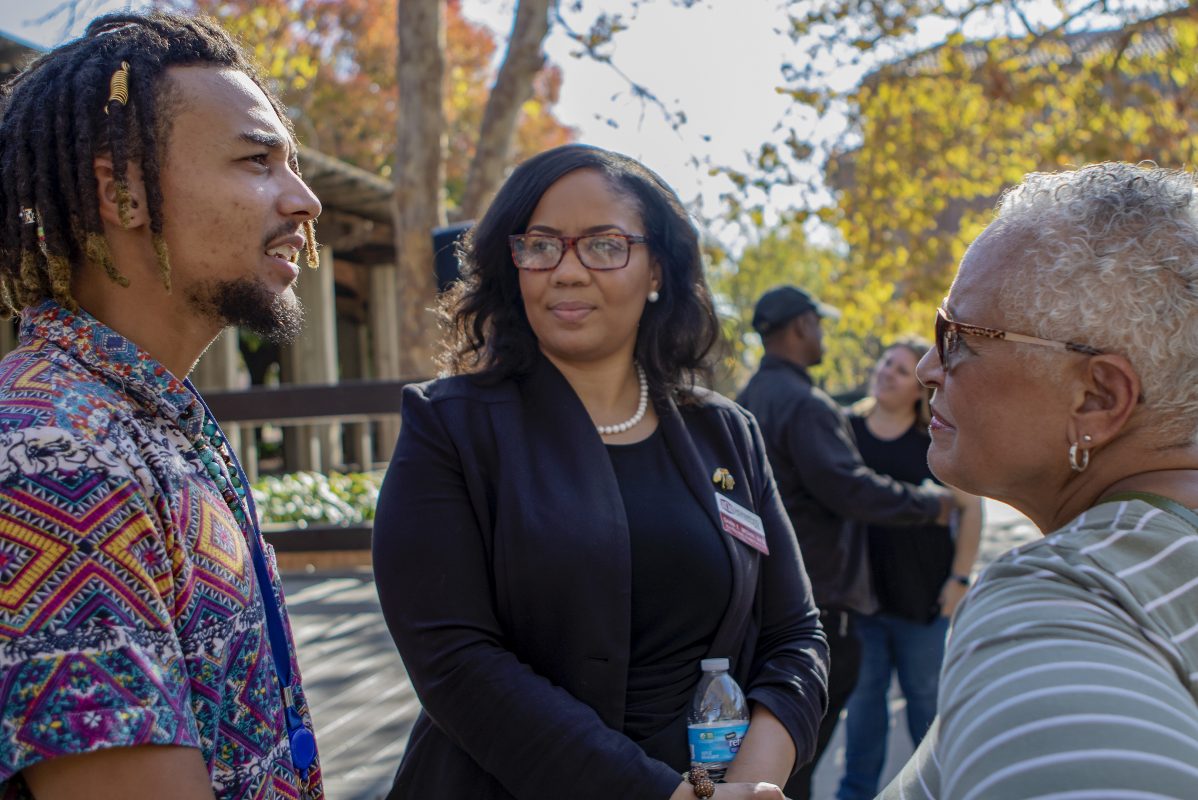
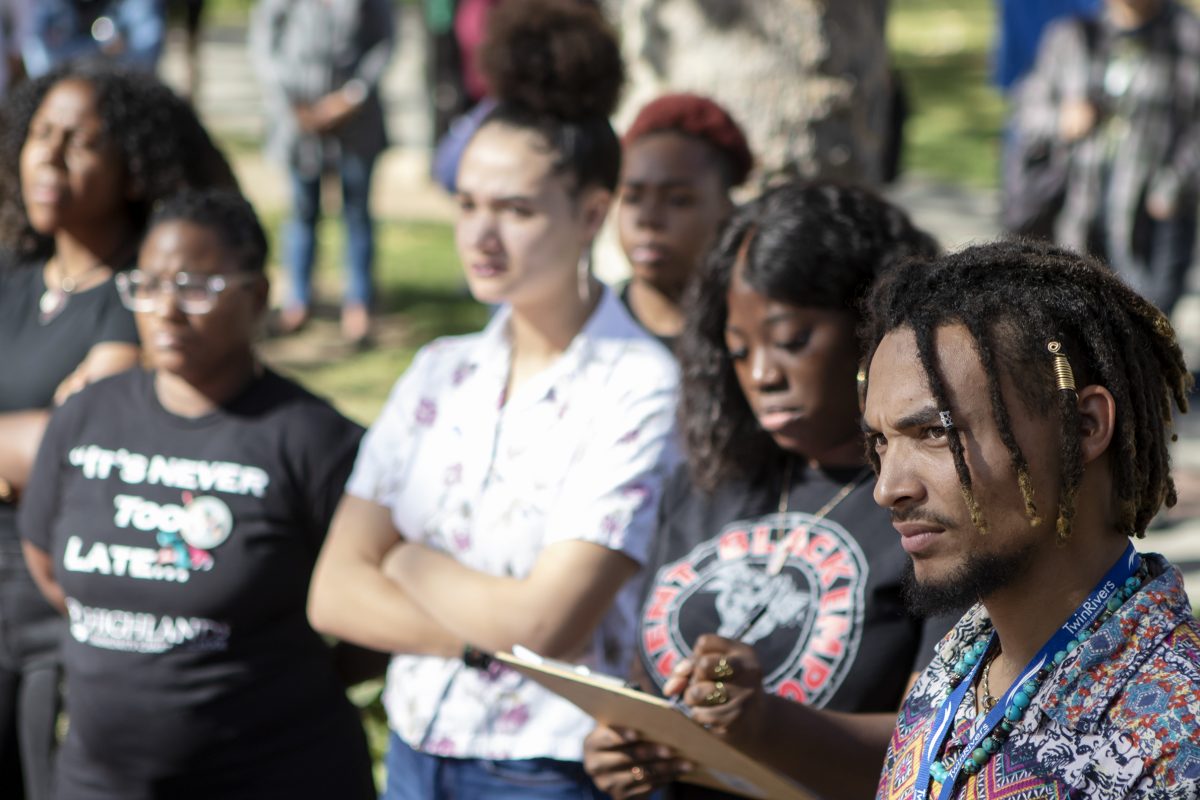
Previous
Next
Noting the recent split of the Black Lives Matter group in Sacramento—now Black Lives Matter Sacramento and Sacramento For Black Lives—Scott-Femenella said he was contacted by both groups to organize protests, and decisions weighed heavily on his mind.
Scott-Femenella said Tanya Faison, former head of the Black Lives Matter Chapter in Sacramento, was accused of abusing her power and disavowed by the Black Lives Matter network, and said she could no longer be associated with BLM. This caused a split, and Scott-Femenella said the true BLM movement in Sacramento now goes by Sacramento For Black Lives, headed by Sonia Lewis.
“I could have raised hell at Sac City, but I didn’t,” Scott-Femenella said. “At the time I was very conflicted about which Black Lives Matter group would come and if there would be conflict and how that would play out. When you’re put in this situation, it’s kind of hard to figure out, ‘What’s the desired effect that I am going to have about this?’”
Scott-Femenella continued his path of advocacy, speaking on the “Black Experience in America” panel at the Racial Healing in America conference in February.
“I took that time to talk about what happened to me and vent about how in the Black community we experience so many things that get gaslighted, get written off by society as a whole,” Scott-Femenella said.
An important takeaway from the panel discussion for Scott-Femenella was identifying the difference between being anti-racist and non-racist.
“When you’re anti-racist, you’re an advocate, you’re vocal about it, you say, ‘What happened to Stephon Clark was wrong. Regardless of what he was doing that night, he did not deserve to die. This happened to him because he was Black. It would not have happened to a white person.’ That’s an anti-racist stance,” Scott-Femenella said. “Non-racism is like, ‘I’m not racist, but I think Stephon Clark could have done things differently,’ or, ‘I’m not racist, but I don’t think that police are oppressive in any communities.’”
Scott-Femenella stressed the importance of taking an anti-racist stance.
“In these times we need people to be vocal in some way,” Scott Femenella said, “to be able to stand up when someone is justifying dehumanizing other people and say, ‘No, that’s wrong.’”
Although Scott-Femenella expressed disdain for the lack of progress from the Los Rios administration meetings, he said there is one person who has earned his trust to bring accountability.
“Chief Savidge has been one of the most supportive characters out of the administration to me in terms of offering resources, checking in on me—he still checks in on me, he was checking in on me recently about quarantine and my family—so I think we’re developing a good relationship,” said Scott Femenella. “It’s funny how some of those things start, but it’s not always about how they start, it’s about how these things end.”
Savidge said that LRPD has had two training sessions since Scott-Femenella’s detainment, one in November serving as a debrief—watching video of what happened and discussing what could have been done better from a law enforcement perspective—and another in January with a special guest.
“Our guest speaker was Chief Word. Chief Word is a retired police chief from Vacaville and former police chief of the Oakland Police Department. Chief Werd is an African-American,” Savidge said. “He was able to talk to us and the officers from both sides of the situation, being an African-American, the African-American experience, the African-American male experience—he also talked about how law enforcement can better understand those dynamics. He had a lot of good information. The officers were very respective; they had a lot of good questions. It was an excellent training session; a lot came out of that. Everyone learned a lot.”
Savidge said the coronavirus pandemic has sidelined further planned training sessions—forcing him to cancel February’s training session—but that LRPD plans to resume them when possible.
“February’s training was scheduled around the Hispanic Latino community,” Savidge said. “We’re not just focusing on strictly African-Americans—that was extremely important—but it made us realize there’s a lot of other things we know we need to have a better understanding of.”
An old man told his grandson, “My son, there is a battle between two wolves inside us all. One is Evil. It is anger, jealousy, greed, resentment, inferiority, lies and ego. The other is Good. It is joy, peace, love, hope, humanity, kindness, empathy and truth.” The boy thought about it and asked, “Grandfather, which wolf wins?” The old man quietly replied, “The one you feed.”
—Cherokee proverb, from Pete Muller’s “Tale of Two Wolves: Studies of Men and Behavior”
As a Sacramento musician, producer and artist—known by the moniker “Madk@p”—Scott-Femenella said he pours his emotions into his work. He said he’d already been writing songs about social justice, and the incident at City College with SPD added fuel to an already burning fire.
“It prompted me to want to do my most ambitious project yet called ‘Two Wolves,’ a more introspective project about the battles we face inside ourselves—the two wolves in me, how they fought for my thoughts when that incident happened.”
Scott-Femenella plans to release the project “Two Wolves” on Oct. 10, 2020, the one-year anniversary of his detainment at City College.
“To me, it’s important because we have to realize we are just as capable of committing terrible things if we let our thoughts go unchecked and if we feed our mind with negative thoughts all the time,” Scott Femenella said.
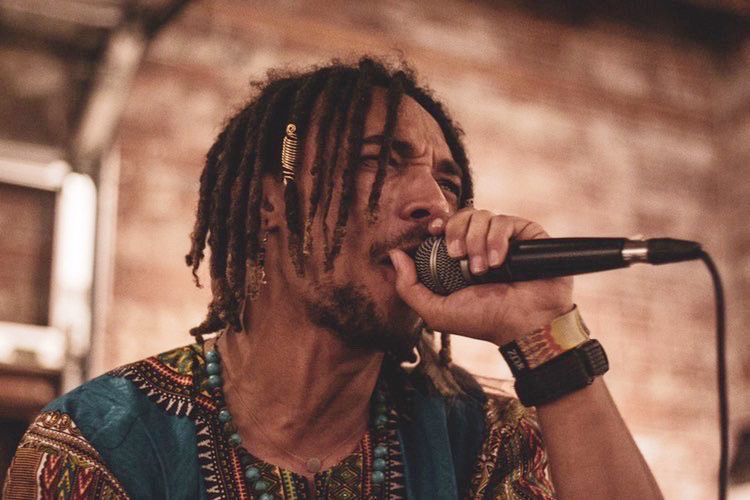
“I think we can make very human mistakes by feeding our brains negative trains of thought, and it can spiral. It’s a normal thing, and it can happen to anybody. I want to normalize people thinking, ‘Oh, I’m not crazy; that’s just the dark wolf in me,” or “Oh, that’s why I feel so conflicted about something that makes me happy.’ When I was going through that situation, that expanded things for me in my perspective of, ‘Wow, just with this incident I have the two wolves battling it out,’ my fear and me just wanting the whole thing to go away, wishing it had never happened, and then the other side of me of, ‘I’m grateful that this happened, I can do so much for the community with this.’”
The Cherokee proverb says the wolf one feeds the most wins. Scott-Femenella said he fed himself positive thoughts after his detainment conflicted about how to contribute to the community from his experience.
“I got the most practice I’ve ever had of, ‘How can I direct my thoughts to positive outcomes? How can I direct my thoughts to not be destructive or counterproductive to me and what I’m trying to do? I don’t want to let this cannonball sink my ship.’”
“Two Wolves” is just one of three musical projects Scott-Femenella said he’s planned for this year.
“I have an EP coming out in the summer called ‘Domino,’ the story of a freedom fighter. How every freedom fighter is a domino to the next, and we have to be conscious of that in our actions—how we are standing up and how we are fighting.”
His third project slated for later this year is “Buffalo Souljah,” another EP Scott-Femenella said will be filled with freedom fighting songs.
“They are going to be radical, in-your-face and combative—just about how Black people are still Buffalo Soldiers; we are still fighting the confederacy,” Scott Femenella said. “The Civil War only ended the conflict between whites. It never ended the conflict of racism done against Black people, never built up Black institutions or gave us any kind of considerable wealth.”
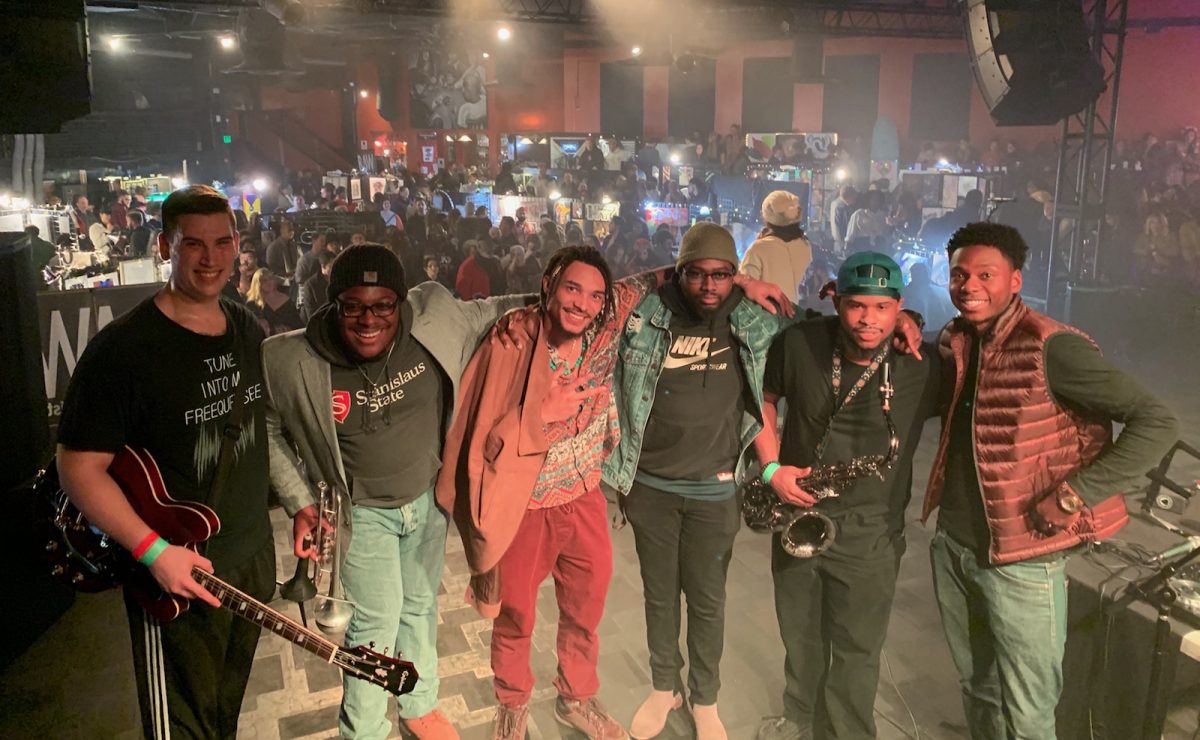
The night of his detainment at City College, Scott-Femenella said the officers considered him malicious based on the color of his skin.
“That’s what the whole thing is about,” Scott-Femenella said. “We are tired of being viewed as malicious.”
Scott-Femenella said the body camera footage that highlighted his involvement in the incident the most was that of LRPD Officer Anderson, who was standing over him after SPD Officer Lakin had detained him.
“He was basically saying I deserve to be in handcuffs,” Scott Femenella said. “I was like, ‘You know what? The reason why I stopped is because y’all love to kill Black folks for no reason.’ He challenged that, and said, ‘Oh, do we now? I don’t think so,’ just flexing his white privilege, completely oblivious to the Black experience and how what he is doing right now could radicalize a whole generation of folks and really hurt people.”
Scott-Femenella is convinced that interaction will have a lasting effect on him.
“It really hurt me, what they did to me,” Scott-Femenella said. “I’ll never forget that incident the rest of my life, feeling scared and afraid to die on my own school campus just walking back to my truck.”
Scott-Femenella circled back to the intent using his music to instigate change.
“A lot of my music I hope will inspire people to be active and not just reactive,” Scott-Femenella said, “to make our community feel safe and whole again, to build us up to the place we want to be. I believe that utopia is possible for all our people, not just Black people.”
“A lot of my music I hope will inspire people to be active and not just reactive, to make our community feel safe and whole again, to build us up to the place we want to be. I believe that utopia is possible for all our people, not just Black people.”
—Theo Scott-Femenella

On an overcast April afternoon, Scott-Femenella leaves his Sacramento home to walk Lady, a young pitbull he is fostering. After his girlfriend found Lady shivering in a parking lot, Scott-Femenella agreed to take her in shortly before the quarantine due to the COVID-19 pandemic went into effect. Animal shelters have since closed their doors, leaving Lady in his care until he can find a home for her.
Scott-Femenella walks Lady to a nearby park to meet a family interested in taking her into their home. After spending some time with Lady, the family decides against taking her in.
“She’s a little too rambunctious?” asks Scott-Femenella.
“I just think we’re not really connected with her,” says the man.
The situation is less than ideal, but Scott-Femenella is determined to find Lady a loving home.
Scott-Femenella works at the Roberts Family Development Center, where he is a youth mentor for a school in Del Paso Heights he said is notorious for violence, with kids from an economically disenfranchised community. He said after the incident with SPD at City College, he did not hesitate to tell his students about it.
“I brought it to them directly, and I will continue to be an educator for them on how to safely conduct themselves during a police encounter,” Scott-Femenella said.
The Roberts Family Development Center is currently conducting its work over Zoom due to the shelter-in-place order. Scott Femenella noted some difficulties with such distancing.
“A lot of the face to face in-person, the energy is where they get a lot of the healing and mentorship,” Scott-Femenella said. “What gets lost in a blind eye is that the reason for after-school programs is to get the kids off the street that aren’t doing anything. Now that there’s no school, there’s not only more opportunity but more incentive to do that than ever. Having a one-hour Zoom meeting versus being able to sit with them for three, four or six hours after school and talk them through things is a major hit. Especially not getting that one-on-one time.”
A May article in The Atlantic cites a study saying “a 1% increase in the unemployment rate leads to a 25% increase in child neglect and a 12% increase in physical abuse.”
In a late April Sacramento County press release on COVID-19, Sacramento County Director of Child, Family and Adult Services Michelle Callejas expressed concern over a decrease in the volume of calls to the child abuse hotline. She attributed that change to the fact that children have not been able to connect with their teachers and daycare staff.
“Since the school closures, calls to Sacramento County Department of Child, Family & Adult Services Child Abuse Hotline decreased by roughly 22% in March over the same time last year. The Department is also on target for an almost 50% drop in hotline calls for April,” Callejas said in the press release.
Scott-Femenella also shared his concern for kids who may be cooped up in a house with abusive or toxic family members.
“They’re maybe being traumatized in other ways right now that we won’t fully be able to understand or talk them through,” Scott-Femenella. “That’s crushing. We have like 100 kids, and we didn’t even get to say goodbye to them.
“I just hope that the teachers are not only being too invasive in their private life assigning them too much work, but that they understand in a pandemic, people are going to die, and these kids need time to mourn, heal and process the situation. Extra school work might not be the answer to that. Maybe some of the learning they need to do right now is learning about life.”
Scott-Femenella said his main duty is to help the kids process the pandemic and has been talking to them via Zoom at least five days a week.
“The only thing we can’t do on Zoom that we were already doing is having that one-on-one bond, that soul-to-soul connection can’t be matched through a screen,” Scott-Femenella said. “I hope this pandemic doesn’t normalize human connection through a screen. We still need to be around each other; we need to be able to feel each other.”
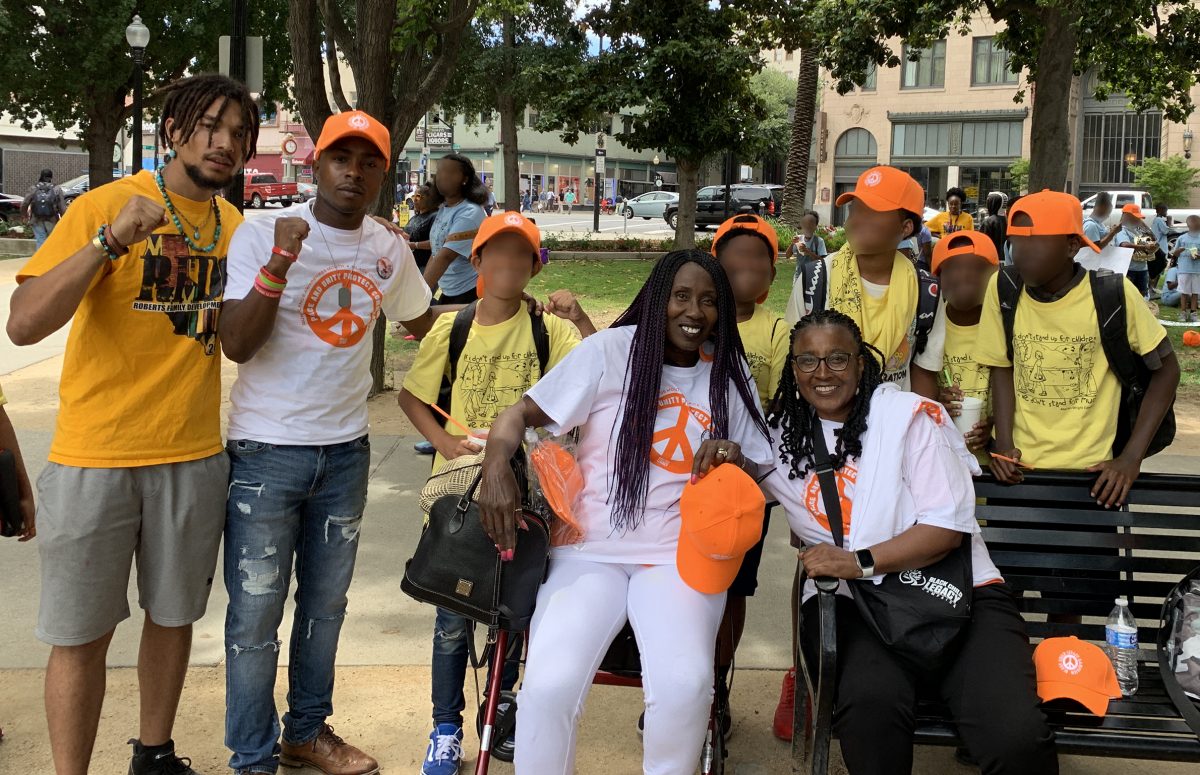
Scott-Femenella said the Roberts Family Development Center has kept him and all its staff employed during the pandemic.
“They’ve treated us like family, and we’re getting paid around the same,” Scott-Femenella said. “Hats off to them. I’m truly blessed to be working for that organization. Not only do they treat their employees like family, they treat the kids like family. You really get that family experience from the top to the bottom.”
Scott-Femenella said food and supplies are available at the main Roberts Family Development Center for families in need. He said the quarantine has brought the importance of community to light.
“We really have to lean on the community in the midst of this pandemic. Check in on people you normally wouldn’t check in on. Buy your elders groceries,” Scott-Femenella said. “Individualism won’t work; it’s not how we are going to survive this. We need to break out of this individualistic mindset and realize that we’re a part of something bigger. How fed is our community? Are they comfortable? Not just, ‘Am I comfortable?’ That’s the mindset that has to be shifted.”
Just as a global pandemic has brought perspective, Scott-Femenella said so did his incident at City College with SPD.
“It reaffirmed to me that I do have a purpose,” Scott-Femenella said. “Maybe the great spirit put that situation in front of me to give me that perspective. I needed to get in the trenches—because I do have privilege. I am a light-skinned, half-Black man. I have incredible privilege.”
Recognizing his own privilege, Scott-Femenella asks others to do the same.
“I grew up in a middle class family, always had food on the table. Always had two parents. Always had people to help me with homework when I got home. Little things that my students I work with don’t have,” said Scott-Femenella. “I always take my privilege into account especially when I work with my students and just walking through life in general. It would be hypocritical of me to not check my privilege when I’m asking others to check theirs, especially the police. I think that’s something we can all do, regardless of age, skin color, gender or identity.”
Scott-Femenella said he encourages people to be mindful about making a positive impact on the community.
“We need to be able to check and recognize our blessings and privileges. We can’t help those who are less privileged if we don’t know the extent to which we have and they don’t.”
Lady, the pitbull Scott-Femenella was fostering at the time of reporting, has since found a loving home.
















